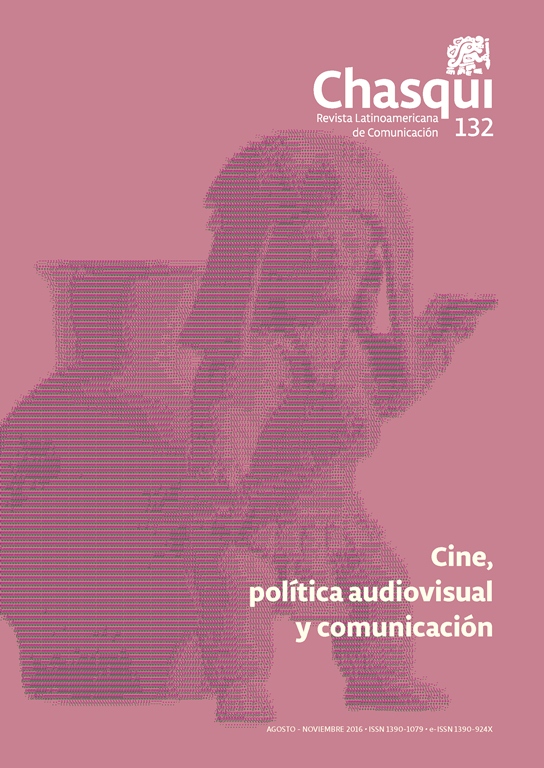The communication in Latin American code
DOI:
https://doi.org/10.16921/chasqui.v0i132.2888Keywords:
coloniality, alternative thought, critique, independence, developmentAbstract
In pointing out Latin America as a distinct locus of enunciation for Communication it is not intended to materialize a kind of epistemological privilege for this territory. It is to explore and exploit the fact that the region synthesizes a structural placement from which it is possible to carry out a non-Eurocentric reinterpretation of the history of the world, and promoting the dismantling of the mechanisms of compulsory westernization to which the world surrendered after the integration of America to planetary geography. Feasible, therefore, from this part of the globe to raise a new alter(n)ative communication, first in the epistemological-theoretical level and then the praxis.References
Arciniegas, G. (2005). Cuando América completó la Tierra. Bogotá: Villegas.
Arpini, A. (Comp.). (2003). Otros discursos. Estudios de Historia de las Ideas Latinoamericanas. Mendoza: Universidad Nacional de Cuyo.
Bautista, J.J. (2013). Hacia una crítica-ética de la racionalidad moderna. La Paz: Rincón.
Beltrán, L.R. ([1976] 1982). Premisas, objetos y métodos foráneos en la investigación sobre comunicación en América Latina. En de Moragas, Miquel (Ed.) Sociología de la comunicación de masas (pp. 94-119). Barcelona: Gustavo Gili.
Beltrán, L.R. (2013). Comunicación para el Desarrollo. Origen, Teoría y Práctica. Oruro: Comunicación.
Beorlegui, C. (2010). Historia del pensamiento filosófico latinoamericano. Una búsqueda incesante de la identidad. Bilbao: Universidad de Deusto.
Castro-Gómez, S. & Grosfoguel, R. (2007). Prólogo. Giro decolonial, teoría crítica y pensamiento heterárquico. En El giro decolonial. Reflexiones para una diversidad epistémica más allá del capitalismo global. Bogotá: Siglo del Hombre.
CIESPAL (1973). Informe provisional: Seminario sobre ”La investigación de la comunicación en América Latina”. Chasqui. N°4, p. 11-25. Recuperado de http://bit.ly/2ewRpnj.
Dussel, E. (2008). 1492 – El encubrimiento del Otro. Hacia el origen del “Mito de la modernidad”. La Paz: Biblioteca Indígena.
Foucault, M. ([1968] 1986). Las palabras y las cosas. Una arqueología de las ciencias humanas. México: Siglo XXI.
Kane, O. (2011). África y la producción intelectual no eurófona. Introducción al conocimiento islámico al sur del Sáhara. Madrid: Oozebap.
Lander, E. (Comp.). (2000). La colonialidad del saber: eurocentrismo y ciencias sociales. Perspectivas latinoamericanas. Buenos Aires: CLACSO.
Mejía, Ó. (Dir.) (2013). Identidad y pensamiento latinoamericano. Bogotá: Universidad Nacional de Colombia.
O´Gorman, E. ([1958] 2005). La invención de América. México: Fondo de Cultura Económica.
Quijano, A. (2009). Colonialidad del poder y clasificación social. En Saavedra, J.L. (Comp.) Teorías y políticas de descolonización y decolonialidad. Cochabamba: Verbo Divino (149-190).
Reinaga, F. (1978). El pensamiento amáutico. El pensamiento indio. La Paz: Partido Indio de Bolivia.
Salazar, A. ([1968] 2006). ¿Existe una filosofía de nuestra América? México: Siglo XXI.
Todorov T. ([1982] 1998). La conquista de América. El problema del otro. México: Siglo XXI.
Torrico, E. (2015a). La “comunicación occidental”. Eurocentrismo y Modernidad: marcas de las teorías predominantes en el campo. Journal de Comunicación Social. 3, 41-64. La Paz: Universidad Católica Boliviana.
Torrico, E. (2015b). Contribuciones y límites del pensamiento teórico latinoamericano en la constitución moderna del campo conceptual de la Comunicación: 1960-2009. Estudio inédito. La Paz.
Zea, L. ([1965] 1976). El pensamiento latinoamericano. Barcelona: Ariel.
Zea, L. ([1969] 2010). La filosofía americana como filosofía sin más. México: Siglo XXI.
Downloads
Published
Issue
Section
License
- Authors retain copyright and grant the journal right of first publication with the work simultaneously licensed under a Creative Commons Attribution-NoDerivs License (CC BY-ND) that allows others to share the work with an acknowledgement of the work's authorship and initial publication in this journal.
- Authors are able to enter into separate, additional contractual arrangements for the non-exclusive distribution of the journal's published version of the work (e.g., post it to an institutional repository or publish it in a book), with an acknowledgement of its initial publication in this journal.
- Authors are permitted and encouraged to post their work online.

